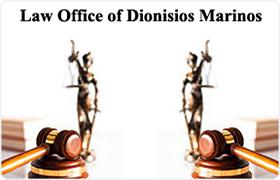Glendale Child Support Lawyer, California
Sponsored Law Firm
-
 x
x

Click For More Info:
-
Law Office of Dionisios Marinos
5150 E Pacific Coast Hwy Suite 200 Long Beach, CA 90804» view mapDivorce & Family Law Committed To Client Satisfaction
Don't hesitate to call the Law Office of Dionisios Marinos in Long Beach, CA. We are committed to your satisfaction. Call us today.
800-846-1250
Liana Nazaryan
Family Law, Child Support, Estate Planning, Adoption
Status: In Good Standing *Status is reviewed annually. For latest information visit here
FREE CONSULTATION
CONTACTDemetria L. Graves
Dispute Resolution, Child Support, Adoption, Criminal
Status: In Good Standing *Status is reviewed annually. For latest information visit here
FREE CONSULTATION
CONTACTJesse A. Verdin
Farms, Divorce, Child Support, Civil Rights
Status: In Good Standing *Status is reviewed annually. For latest information visit here
FREE CONSULTATION
CONTACTRoberta Bennett
Alimony & Spousal Support, Child Support, Adoption, Civil Rights
Status: In Good Standing *Status is reviewed annually. For latest information visit here
Adrienne M. Liebman
Adoption, Alimony & Spousal Support, Child Support, Farms
Status: In Good Standing *Status is reviewed annually. For latest information visit here
Rozanna M. Velen
Farms, Family Law, Divorce, Child Support
Status: In Good Standing *Status is reviewed annually. For latest information visit here
Maureen Stubbs
Farms, Family Law, Divorce, Child Support
Status: In Good Standing *Status is reviewed annually. For latest information visit here
FREE CONSULTATION
CONTACTVeronika Melamed
Paternity, Child Support, Child Custody, Divorce & Family Law
Status: In Good Standing *Status is reviewed annually. For latest information visit here
David L. Gamblin
Adoption, Alimony & Spousal Support, Child Support, Civil Rights
Status: In Good Standing *Status is reviewed annually. For latest information visit here
 Dionisios Marinos Long Beach, CA
Dionisios Marinos Long Beach, CA Practice AreasExpertise
Practice AreasExpertise